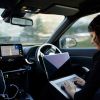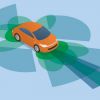Remote driving allows someone to control a vehicle from a different location – even from a different country. It has seen wide adoption in recent years in several industries, and some consumer vehicles have remote control parking where the driver must be present within a short range. However, it isn't currently being used to control a vehicle driving on public roads.
The technology is in place in the UK at various work environments, farms, mines, and warehouses – but it could also be introduced to vehicles such as delivery vans and rental cars.
As a result, the Commission has asked the Government to provide clarity on how to regulate the technology of vehicles being controlled from remote locations.
According to the wider review, commissioned by the Department for Transport (DfT) and the Centre for Connected and Autonomous Vehicles (CCAV), there are several key topics that need to be thoroughly investigated with regards to the application of the technology.
Concerns were raised during the investigation that looked into how reliable the connection between the driver and the vehicle is, as well as how a driver’s situational awareness would be impacted.
There were also issues raised over the future of cybersecurity in the UK.
Furthermore, the Commission has asked for the Government to look into accident liability, should there be any collisions as a result of remote driving technology.
Immediately following the announcement, the Law Commission recommended that the government should use temporary prohibition measures while they address the current legislation.
Public law commissioner Nicholas Paines KC said: “Our advice concludes that in the immediate term, the government would be able to address some gaps in the law around remote driving using existing powers, while also providing a path for companies to use the technology lawfully provided that their systems are safe.
“In the longer term, it could set up a full system of remote driving regulation.”
The Commission also stated that any remote driving in a public space in the future should only happen if companies gain special permissions. This is currently not enshrined in UK law – and the study urged the Government to address this as soon as possible.
There were also calls from the Commission to set out a guideline for safety standards and official licensing in the future, should it be more widely adopted in industries and on the roads.
From a legal perspective, the Commission believes that remote drivers should not be liable for any problems that could be outside of their control – highlighting the importance for the Government to outline a set of safety standards.
These should be focused on connectivity issues or damaged electronics.
As a result, the manufacturers and operators would be liable for any incidents.
However, one of the main challenges that arose from the study was around the use of remote drivers from abroad.
The Law Commission has strongly advised the Government to ban remote drivers from overseas – due to concerns around safety, and the enforcement of the law on them, should any incidents occur.
What do you make of the Commissions’ review? With the rise of autonomous, self-driving and related technologies – would you want them on UK roads? Leave your comments below.

RAC sale – up to 33% off*
• Roadside cover from £5.29 a month†
• We get to most breakdowns in 60 mins or less
• Our patrols fix 4/5 breakdowns on the spot











